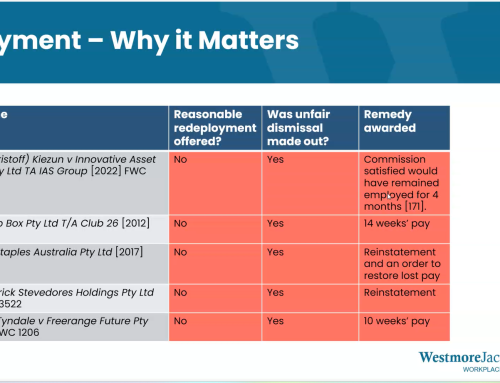
The fast pace of employment law change continues with a number of significant decisions in recent months. Due to the number of changes, we are publishing our August edition in two parts. This is part 1.
This part discusses two topics. The first is the inclusion of unpaid family and domestic violence leave entitlements into modern Awards.
The second topic concerns a number of significant Full Bench decisions of the Fair Work Commission which have, in effect, made it easier for employees to make out-of-time unfair dismissal and certain general protection applications.
Part 2 of our August article will be published later this month. It also will discuss two topics. The first being when casual employment counts for the purpose of calculating redundancy payouts. The second topic will discuss when an employee can use a medical report created after their dismissal to challenge a dismissal based on their incapacity.
Below is part 1.
Unpaid Family and Domestic Violence Leave
In July the Full Bench of the Fair Work Commission confirmed that all modern Awards would be changed to include an entitlement to unpaid leave for employees to deal with family and domestic violence. That change took effect on 1 August 2018.
All Award-covered employees (including casual employees) now have an entitlement to 5 days unpaid family and domestic violence leave each year. An employee may take leave if:
- the employee is experiencing family and domestic violence; and
- that employee needs to do something to deal with the impact of family and domestic violence and it is impractical for them to do that thing outside of their ordinary hours of work. This could include activities such as making arrangements for their safety (or the safety of a family member), attending urgent court hearings, or accessing policies services.
The entitlement to 5 days of family and domestic violence leave does not accrue progressively during a year of service. Rather, the full entitlement becomes available to an employee at the start of each 12-month period of employment.
Employees who wish to take family and domestic violence leave must comply with the notice and evidence requirements set out in their relevant Award. Employers who receive notice or evidence from employees have an obligation under the Award to take steps to treat that information with as much confidentiality as is reasonably practicable.
Award covered employers should be aware of their new obligations regarding domestic and family violence leave. If you are uncertain of what your obligations under an applicable modern Award are, or how to comply with them, please contact us.
It is Now Easier for Employees to Bring Out-of-Time Unfair Dismissal and Certain General Protections Applications
The bar for when an employee can lodge an unfair dismissal or certain general protections applications outside of the 21-day time limit has, in effect, been lowered.
Under the Fair Work Act, an employee can only proceed with an unfair dismissal application or certain general protections application lodged beyond 21 days of their dismissal if the Fair Work Commission is satisfied there are “exceptional circumstances”.
In two recent decisions, the Full Bench of the Fair Work Commission has clarified what an employee must show to establish there are “exceptional circumstances”. The two cases are Long v Yarra Trams
Cheval was often cited for the proposition that employees must provide a credible explanation for the whole of their delay in lodging their out-of-time application. If an employee could not do this, then the Commission would generally not be satisfied that “exceptional circumstances” existed.
The subsequent Full Bench decisions in Yarra Trams and Richmond Oysters held that this approach was incorrect. The Commission explained that the presence of an explanation (or lack thereof) for the late application is just one of a number of factors the Commission is to consider when deciding whether “exceptional circumstances” exist.
The Commission explained that, depending on the circumstances, “exceptional circumstances” may mean out-of-time applications can proceed even where the employee cannot provide an explanation for the whole period of the delay.
The other factors the Commission must consider are set out in s 366(2) of the Fair Work Act for general protections applications and s 394(3) of that Act for unfair dismissal applications. The factors include:
- any action taken by the [employee] to dispute the dismissal; and
- prejudice to the employer (including prejudice caused by the delay); and
- the merits of the application; and
- fairness as between the [employee] and other persons in similar positions.
The effect of these recent decisions is a lowering of the bar for out-of-time unfair dismissal and certain general protections applications. For out-of-time applications to proceed to hearing, no longer must employees explain the whole period of their delay as to convince the Commission there are “exceptional circumstances”. However, a failure by an employee to explain a delay will be relevant as to whether “exceptional circumstances” exist.
Adam Colquhoun
Principal, WestmoreJacobs
This article is general information only. It is not legal advice. If you need legal advice, please contact us.






Leave A Comment